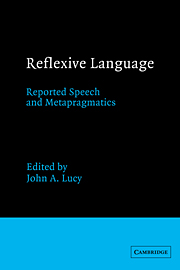Book contents
- Frontmatter
- Contents
- Acknowledgments
- General introduction
- Part I Theoretical foundations
- Part II The relation of form and function in reflexive language
- Introduction to Part II
- 3 The boundaries of reported speech in narrative discourse: some developmental aspects
- 4 Metapragmatic presentationals: reporting speech with quotatives in Yucatec Maya
- 5 Metalanguage and pragmatics of deixis
- 6 Learning what to ask: metapragmatic factors and methodological reification
- Part III Text, context, and the cultural functions of reflexive language
- Part IV Interpretation, reported speech, and metapragmatics in the Western tradition
- Name index
- Subject index
6 - Learning what to ask: metapragmatic factors and methodological reification
from Part II - The relation of form and function in reflexive language
Published online by Cambridge University Press: 22 January 2010
- Frontmatter
- Contents
- Acknowledgments
- General introduction
- Part I Theoretical foundations
- Part II The relation of form and function in reflexive language
- Introduction to Part II
- 3 The boundaries of reported speech in narrative discourse: some developmental aspects
- 4 Metapragmatic presentationals: reporting speech with quotatives in Yucatec Maya
- 5 Metalanguage and pragmatics of deixis
- 6 Learning what to ask: metapragmatic factors and methodological reification
- Part III Text, context, and the cultural functions of reflexive language
- Part IV Interpretation, reported speech, and metapragmatics in the Western tradition
- Name index
- Subject index
Summary
Introduction
Sociolinguists have long grappled with the difficult problem posed by units of analysis, those abstract theoretical compartments into which we fit the ongoing flow of speech and social interaction. At one level, this analytic reification captures those aspects of linguistic interaction that are specifiable in the abstract across contexts, the regularities that can be presupposed before any particular speech act takes place. Yet at another level, an analysis in these terms partially obscures the dynamic relation whereby language and context create and reflect social meaning in spontaneous and unpredictable ways. In addition to the perhaps unavoidable problem entailed by analytic abstraction, an added level of difficulty arises when the analyst's conception of language and its use differs from that of the speakers. This chapter examines the ongoing struggle to capture cross-contextual sociolinguistic regularities, focusing in particular upon the study of code-switching. It draws upon data from a Gaelic—English bilingual community in Canada to demonstrate the tension involved in applying abstract analytic categories to speech, a tension that is heightened when the speakers themselves hold a different, more contextual model of speaking. Although in one sense this tension is inevitable, an adequate linguistic analysis must take account of informants' own metapragmatic categories; to apply the standard sociolinguists' “grid” without generating this account is to risk a distorted view of linguistic processes.
Information
- Type
- Chapter
- Information
- Reflexive LanguageReported Speech and Metapragmatics, pp. 159 - 174Publisher: Cambridge University PressPrint publication year: 1993
Accessibility standard: Unknown
Why this information is here
This section outlines the accessibility features of this content - including support for screen readers, full keyboard navigation and high-contrast display options. This may not be relevant for you.Accessibility Information
- 10
- Cited by
